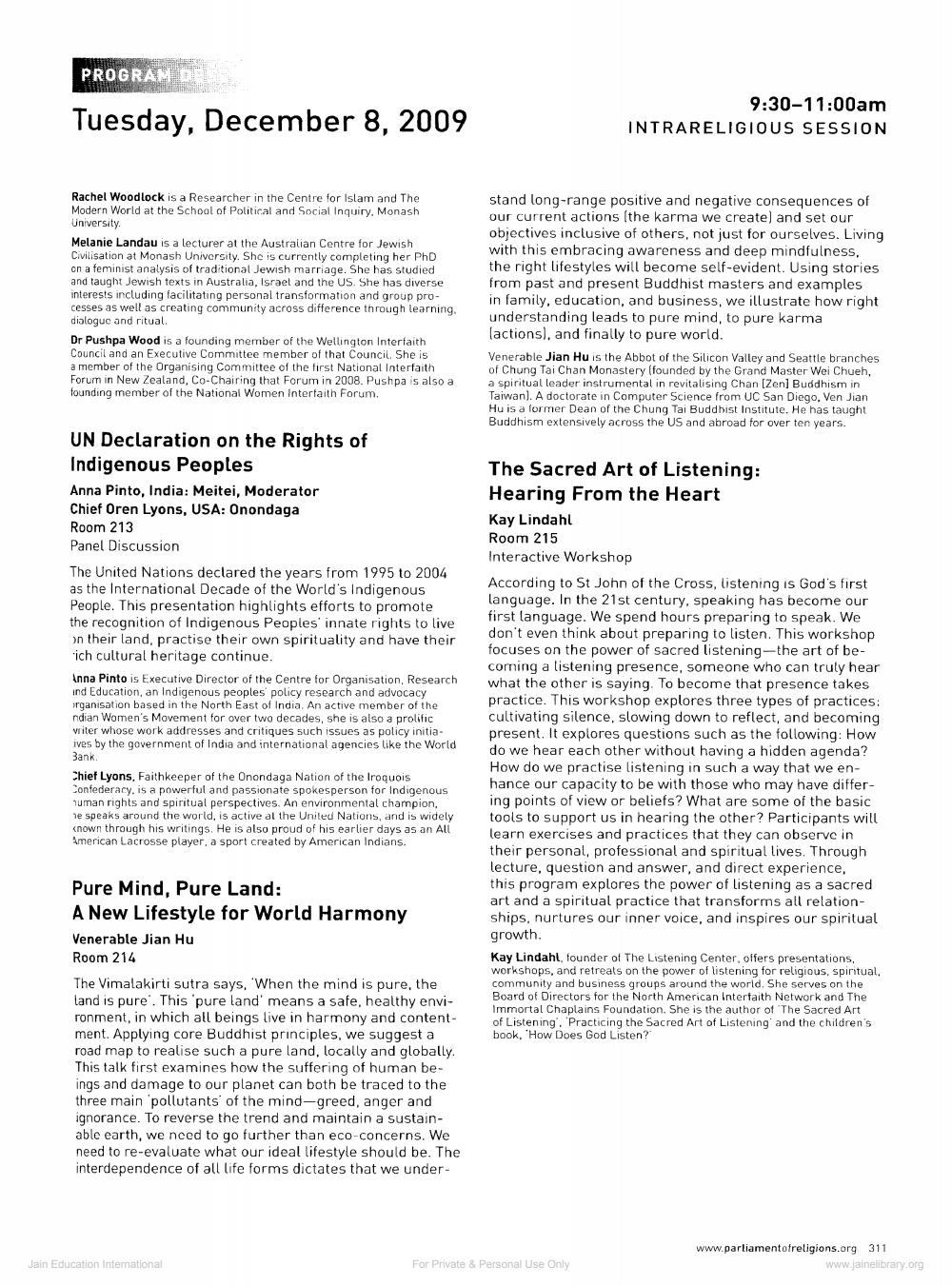________________
PROGRAM DES
Tuesday, December 8, 2009
Rachel Woodlock is a Researcher in the Centre for Islam and The Modern World at the School of Political and Social Inquiry, Monash University.
Melanie Landau is a lecturer at the Australian Centre for Jewish Civilisation at Monash University. She is currently completing her PhD on a feminist analysis of traditional Jewish marriage. She has studied and taught Jewish texts in Australia, Israel and the US. She has diverse interests including facilitating personal transformation and group processes as well as creating community across difference through learning. dialogue and ritual.
Dr Pushpa Wood is a founding member of the Wellington Interfaith Council and an Executive Committee member of that Council. She is a member of the Organising Committee of the first National Interfaith Forum in New Zealand, Co-Chairing that Forum in 2008. Pushpa is also a founding member of the National Women Interfaith Forum.
UN Declaration on the Rights of
Indigenous Peoples
Anna Pinto, India: Meitei, Moderator Chief Oren Lyons, USA: Onondaga Room 213
Panel Discussion
The United Nations declared the years from 1995 to 2004 as the International Decade of the World's Indigenous People. This presentation highlights efforts to promote the recognition of Indigenous Peoples' innate rights to live on their land, practise their own spirituality and have their ich cultural heritage continue.
Anna Pinto is Executive Director of the Centre for Organisation, Research ind Education, an Indigenous peoples' policy research and advocacy rganisation based in the North East of India. An active member of the ndian Women's Movement for over two decades, she is also a prolific writer whose work addresses and critiques such issues as policy initiaives by the government of India and international agencies like the World Bank.
Chief Lyons, Faithkeeper of the Onondaga Nation of the Iroquois Confederacy, is a powerful and passionate spokesperson for Indigenous human rights and spiritual perspectives. An environmental champion, he speaks around the world, is active at the United Nations, and is widely <nown through his writings. He is also proud of his earlier days as an All American Lacrosse player, a sport created by American Indians.
Pure Mind, Pure Land:
A New Lifestyle for World Harmony
Venerable Jian Hu Room 214
The Vimalakirti sutra says, 'When the mind is pure, the land is pure. This 'pure land' means a safe, healthy environment, in which all beings live in harmony and contentment. Applying core Buddhist principles, we suggest a road map to realise such a pure land, locally and globally. This talk first examines how the suffering of human beings and damage to our planet can both be traced to the three main 'pollutants of the mind-greed, anger and ignorance. To reverse the trend and maintain a sustainable earth, we need to go further than eco-concerns. We need to re-evaluate what our ideal lifestyle should be. The interdependence of all life forms dictates that we under
Jain Education International
9:30-11:00am INTRARELIGIOUS SESSION
stand long-range positive and negative consequences of our current actions (the karma we create) and set our objectives inclusive of others, not just for ourselves. Living with this embracing awareness and deep mindfulness, the right lifestyles will become self-evident. Using stories from past and present Buddhist masters and examples in family, education, and business, we illustrate how right understanding leads to pure mind, to pure karma (actions), and finally to pure world.
Venerable Jian Hu is the Abbot of the Silicon Valley and Seattle branches of Chung Tai Chan Monastery (founded by the Grand Master Wei Chueh, a spiritual leader instrumental in revitalising Chan [Zen] Buddhism in Taiwan). A doctorate in Computer Science from UC San Diego, Ven Jian Hu is a former Dean of the Chung Tai Buddhist Institute. He has taught Buddhism extensively across the US and abroad for over ten years.
The Sacred Art of Listening:
Hearing From the Heart
Kay Lindahl
Room 215
Interactive Workshop
According to St John of the Cross, listening is God's first language. In the 21st century, speaking has become our first language. We spend hours preparing to speak. We don't even think about preparing to listen. This workshop focuses on the power of sacred listening-the art of becoming a listening presence, someone who can truly hear what the other is saying. To become that presence takes practice. This workshop explores three types of practices: cultivating silence, slowing down to reflect, and becoming present. It explores questions such as the following: How do we hear each other without having a hidden agenda? How do we practise listening in such a way that we enhance our capacity to be with those who may have differing points of view or beliefs? What are some of the basic tools to support us in hearing the other? Participants will learn exercises and practices that they can observe in their personal, professional and spiritual lives. Through lecture, question and answer, and direct experience, this program explores the power of listening as a sacred art and a spiritual practice that transforms all relationships, nurtures our inner voice, and inspires our spiritual growth.
Kay Lindahl, founder of The Listening Center, offers presentations, workshops, and retreats on the power of listening for religious, spiritual, community and business groups around the world. She serves on the Board of Directors for the North American Interfaith Network and The Immortal Chaplains Foundation. She is the author of 'The Sacred Art of Listening. Practicing the Sacred Art of Listening and the children's book, 'How Does God Listen?
For Private & Personal Use Only
www.parliamentofreligions.org 311 www.jainelibrary.org




